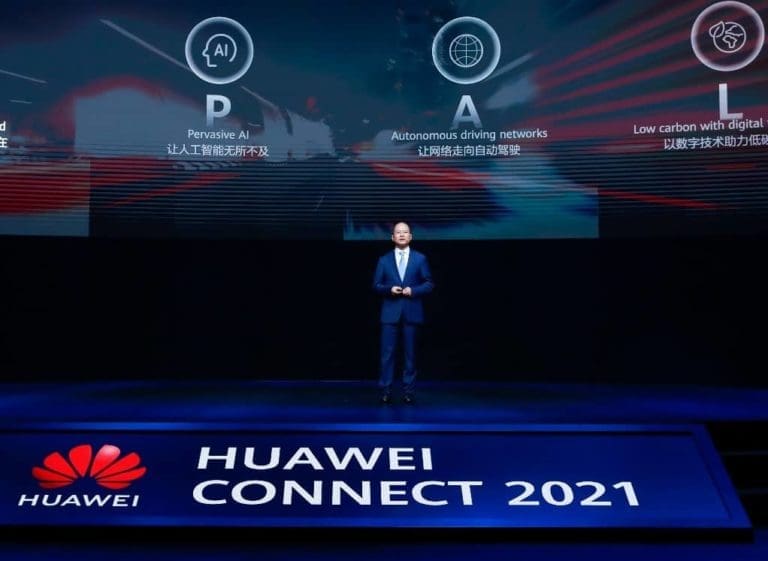Huawei’s annual flagship event for the global ICT industry – Huawei Connect 2021 – kicked off today. Huawei Rotating Chairman Eric Xu opened the event with a keynote speech titled “Innovating Nonstop for Faster Digitalization”.
This year’s event, themed “Dive into Digital“, explores how digital technology can better integrate with business scenarios and industry know-how to address critical business challenges, and how stakeholders can work together more effectively to foster an open industry ecosystem and drive shared success. The event is scheduled to have four keynotes, five summits, and 66 sessions, featuring more than 200 speakers, including industry visionaries, business leaders, top tech experts, and ecosystem partners. It will be live streamed in 11 languages on Huawei’s corporate website and by its media partners. The event will also feature online exhibitions, remote visits to exhibition halls, and open panel discussions, enabling online interaction and one-stop experiences.
In his keynote, Xu spoke about how helping industries go digital is a critical aspect of Huawei’s mission to bring digital to every person, home and organization for a fully connected, intelligent world.
Xu said, “Digital development relies on digital technology. For digital technology to stay relevant, we must continue to innovate and create value. Cloud, AI, and networks are three critical digital technologies.” Xu then shared some of the progress Huawei has made in these three areas, what Huawei is doing to enable low-carbon development, and where the industry as a whole is heading.
Xu explained that Huawei Cloud, the company’s cloud service that was launched just four years ago, has already brought together more than 2.3 million developers, 14,000 consulting partners, and 6,000 technology partners, and also made more than 4,500 services available in the Huawei Cloud Marketplace. It has become an important platform for Internet companies, enterprises, and governments alike to take their organizations digital.
At the event, Xu launched the industry’s first distributed, cloud-native service called UCS – a ubiquitous cloud-native service available on Huawei Cloud. With UCS, Huawei plans to provide enterprises with a consistent experience while using cloud-native applications that are not constrained by geographical, cross-cloud, or traffic limitations, thereby accelerating digital transformation in all industries.
Huawei’s full-stack, all-scenario AI portfolio released back in 2018 is also progressing as expected. Its MindSpore framework has become the mainstream AI computing framework in China. Meanwhile, the Atlas 900 cluster, as well as the cloud services based on it, currently serve more than 300 enterprises, supporting the training of many models which include the Huawei Cloud Pangu large models. Huawei Cloud ModelArts has made AI application development incredibly simple with its full-pipeline, scenario-based services. The end goal of ModelArts is to enable each and every engineer to independently develop their own AI applications.
Xu also introduced Huawei’s innovations in the network domain. As organizations go digital, they tend to see exponential growth in network complexity. To tackle this, Huawei has been innovating solutions for global networks based on the concept of autonomous driving network (ADN). The company has been working with customers in the finance, education, and healthcare sectors to innovate and deploy new applications, and build networks that are self-fulfilling, self-healing, self-optimizing, and autonomous.
Xu went on to explain how Huawei is using digital technology to support low-carbon development, as part of global efforts to achieve peak CO2 emissions and carbon neutrality.
Specifically, Huawei focuses on three key initiatives:
(1) Investing and innovating in energy-saving technologies to deliver more energy-efficient ICT products for a low-carbon ICT industry;
(2) Investing in innovations where power electronics and digital technologies converge to promote clean energy and the digitalization of traditional energy; and
(3) Providing digital technology to help all sectors go digital and low-carbon.
Zhang Ping’an, CEO of Cloud BU and President of Huawei Consumer Cloud Service, elaborated on Huawei Cloud’s strategic initiatives and launched new services and products at the event. “The key to successful digital transformation is to think cloud native and act cloud native,” said Zhang. “Huawei Cloud joins our customers and partners to dive into digital and explore the potential of Everything as a Service – Infrastructure as a Service for global accessibility, Technology as a Service for flexible innovation, and Expertise as a Service for shared excellence.” Zhang announced two new Regions in Mexico and China’s Ulanqab, and launched 10 new Huawei Cloud services. The announcement included MacroVerse – Huawei Cloud aPaaS, OptVerse AI Solver, Huawei Cloud Stack 8.1, SparkRTC – a real-time audio and video service, and Pangu, a large model for drug molecules.
Customers and partners in attendance included Christophe Ozer, Head of Orange Cloud (Orange Flexible Engine) APAC; Wu Qiang, Vice President of Tianjin Port Holdings; Chen Haining, General Manager of IT Dept from Shanghai Pudong Development Bank; and Jiang Chuanrong, Chairman of Shanghai Mirror Pictures. They described their experience of joint innovation with Huawei in their digital transformation. Wu Qiang said, “Tianjin Port is one of the world’s top 10 ports, with an annual throughput of nearly 20 million containers. The Huawei Cloud OptVerse AI Solver helps us improve our planning speed by more than 100 times based on tens of millions of variables and constraints, maximize resource scheduling, and supercharge operation efficiency.”
Xu concluded his speech with, “Nonstop innovation has been the driving force behind digitalization thus far. Moving forward, if we hope to reach more ambitious goals for digitalization, nonstop innovation will continue to be key. So let’s innovate nonstop for a better future.”
Huawei hosts Huawei Connect 2021 online from September 23 to October 31. The theme of this year’s event is Dive into Digital. We’re going to dive deep into the practical application of technologies like cloud, AI, and 5G in all industries, and how they can make organizations of all shapes and sizes more efficient, more versatile, and ultimately more resilient as we move towards economic recovery.
Also read: Huawei Connect: Digital Transformation And Opportunity In An Age Of Disruption

